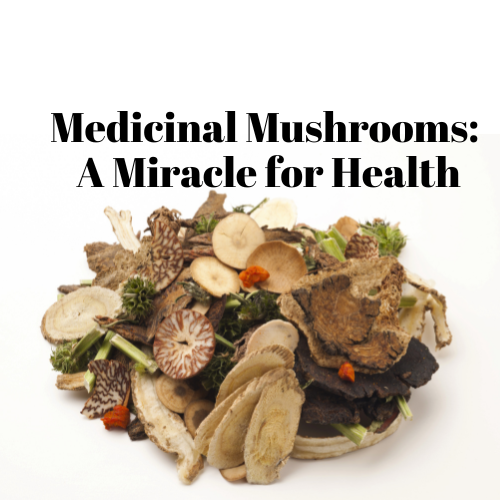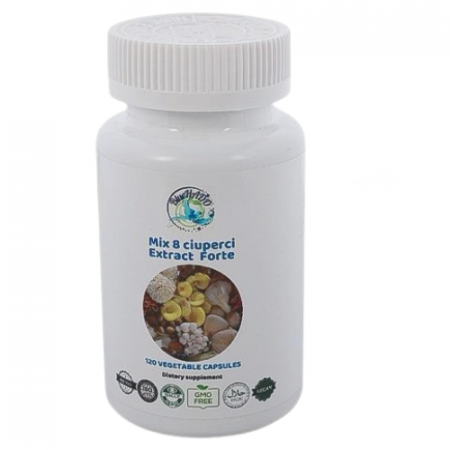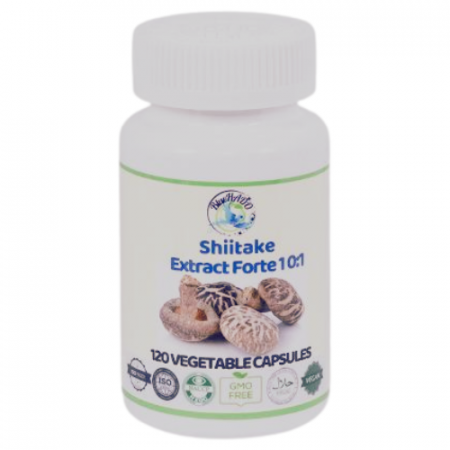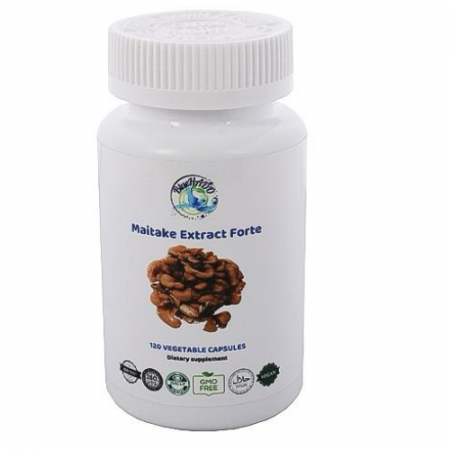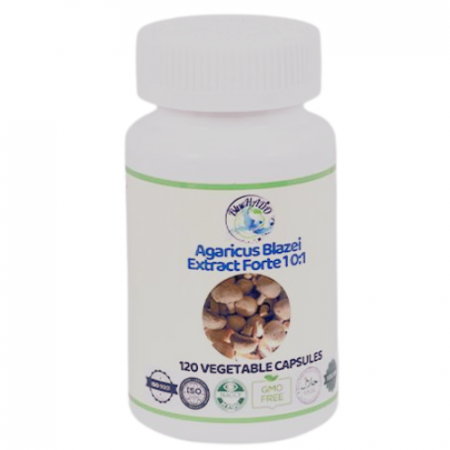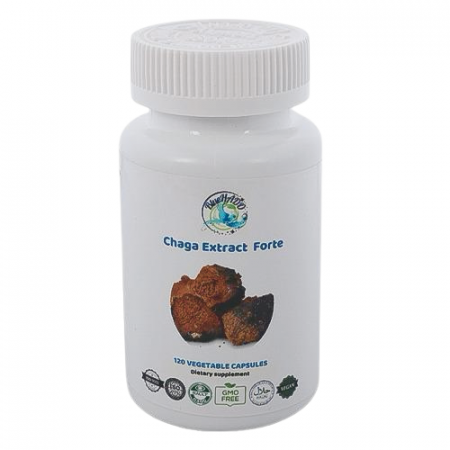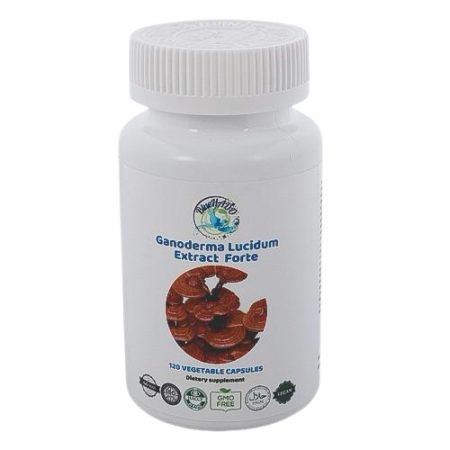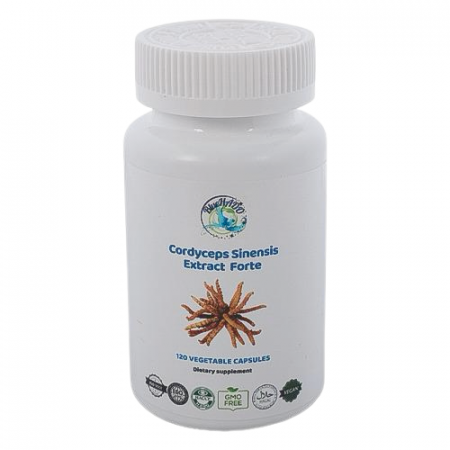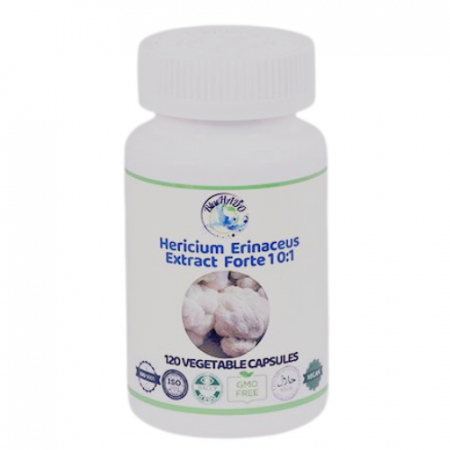Medicinal mushrooms are a special category of fungi that have been used for thousands of years in various cultures for their therapeutic properties. These mushrooms have played an essential role in traditional medicine, especially in Chinese and Japanese traditional medicine, where they have been used to treat a variety of ailments and to support general health.
In recent decades, medicinal mushrooms have gained popularity in modern and integrative medicine. This increased interest is due to numerous scientific studies that have begun to validate the traditional benefits attributed to these mushrooms. From improving the immune system and combating inflammation to supporting cognitive health and offering powerful antioxidant properties, medicinal mushrooms are recognized for their diversity and effectiveness in promoting health.
Today, medicinal mushrooms are available in various forms, including dietary supplements, tinctures, powders, and teas, making them accessible to a wide range of consumers interested in natural remedies and holistic approaches to maintaining health and well-being.
Purpose of the Article
The purpose of this article is to provide readers with a deep and comprehensive understanding of medicinal mushrooms, highlighting their health benefits and traditional and modern uses. Readers will learn:
- What medicinal mushrooms are: Definition and history of their use in traditional and modern medicine.
- Health benefits: A detailed look at how medicinal mushrooms can improve the immune system, cognitive function, and overall health.
- Popular types of medicinal mushrooms: Information about the most commonly used medicinal mushrooms, such as Reishi, Cordyceps, Chaga, and Lion's Mane, and the specific benefits of each.
- Ways to consume them: Various methods to incorporate medicinal mushrooms into the daily diet, including supplements, teas, and culinary ingredients.
- Precautions and contraindications: Essential information about possible side effects and interactions with other medications, highlighting the importance of consulting a specialist before use.
Through this article, readers will gain the necessary knowledge to make informed decisions about using medicinal mushrooms in their daily routine, benefiting from their therapeutic properties in a safe and effective manner.
What are Medicinal Mushrooms?
Definition
Medicinal mushrooms are species of fungi recognized for their therapeutic properties and ability to promote overall health. These mushrooms contain bioactive compounds, such as polysaccharides, triterpenoids, sterols, and alkaloids, which have been shown to have beneficial effects on the immune system, cognitive function, energy, and longevity.
History
The use of medicinal mushrooms dates back thousands of years and is an essential component of traditional medicine in various cultures.
- China: In traditional Chinese medicine (TCM), mushrooms like Reishi (Ganoderma lucidum) and Cordyceps (Cordyceps sinensis) have been used for over 2,000 years. Reishi, also known as "Lingzhi," is often called the "mushroom of immortality" due to its health and longevity benefits.
- Japan: In traditional Japanese medicine, Shiitake (Lentinula edodes) and Maitake (Grifola frondosa) are used for their nutritional and medicinal properties. Shiitake, in particular, is renowned for its immune-boosting effects.
- Other cultures: Various other cultures worldwide, including those in Siberia and regions of North and South America, have used medicinal mushrooms to treat various ailments and support health.
Benefits of Medicinal Mushrooms
Improving the Immune System
Medicinal mushrooms are known for their ability to strengthen the immune system. Bioactive compounds like polysaccharides and beta-glucans stimulate the activity of immune cells, such as macrophages, natural killer (NK) cells, and T-lymphocytes.These help the body fight infections and diseases.
- Reishi: Increases the production of immune cells and improves the overall function of the immune system.
- Shiitake: Contains lentinan, a polysaccharide that stimulates the immune system and has antitumor properties.
- Coriolus: Used in complementary cancer treatments due to its ability to stimulate the immune response.
Antioxidant Properties
Medicinal mushrooms are rich in antioxidants, which protect cells against oxidative stress and damage caused by free radicals. This helps prevent premature aging and the development of chronic diseases.
- Chaga: Contains one of the highest levels of antioxidants, helping protect cells and reduce inflammation.
- Agaricus: Rich in antioxidants, helping combat oxidative stress and supporting overall health.
Improving Cognitive Function
Certain medicinal mushrooms are recognized for their ability to support brain health and improve cognitive function. They can help enhance memory, concentration, and neuronal health.
- Lion's Mane: Contains hericenones and erinacines, compounds that stimulate nerve growth factor (NGF), supporting brain health and neuronal regeneration.
- Reishi: Can help reduce stress and improve sleep quality, indirectly contributing to cognitive health.
Anti-inflammatory Properties
Many medicinal mushrooms have anti-inflammatory properties, helping reduce chronic inflammation in the body, which is associated with numerous degenerative and chronic diseases.
- Reishi: Contains triterpenoids that have anti-inflammatory effects and can help reduce inflammation in the body.
- Cordyceps: Helps reduce inflammation and supports respiratory health.
Other Health Benefits
Medicinal mushrooms offer a wide range of other health benefits, including improving energy levels, supporting metabolic health, and promoting cardiovascular health.
- Cordyceps: Increases energy levels and physical endurance, popular among athletes.
- Maitake: Helps regulate blood sugar levels and supports metabolic health.
- Shiitake: Supports cardiovascular health by reducing cholesterol levels and protecting arteries.
Conclusion
Medicinal mushrooms are a valuable source of nutrients and bioactive compounds that can support overall health and help prevent and treat various ailments. Integrating these mushrooms into the daily diet can bring numerous health benefits, from strengthening the immune system and protecting cells against oxidative stress to improving cognitive function and reducing inflammation.
Popular Types of Medicinal Mushrooms
1. Reishi (Ganoderma lucidum)
- Description: Known as "Lingzhi" or the "mushroom of immortality," Reishi has a red color and a glossy appearance. It has been used for thousands of years in traditional Chinese medicine.
- Active Compounds: Polysaccharides, triterpenoids, sterols, ganoderic acids.
- Benefits:
- Strengthening the immune system: Polysaccharides in Reishi stimulate the production and activity of immune cells, helping the body fight infections and diseases.
- Reducing stress: Triterpenoids have adaptogenic properties, helping reduce stress and anxiety and improve sleep quality.
- Anti-inflammatory properties: Reishi can reduce inflammation in the body, which can help prevent chronic inflammatory diseases.
- Antioxidant properties: Antioxidant compounds in Reishi protect cells from oxidative stress and premature aging.
- Uses: Dietary supplements (capsules, powders), teas, extracts.
2. Cordyceps (Cordyceps sinensis)
- Description: A parasitic mushroom that grows on insect larvae, traditionally used in Chinese medicine to improve vitality and physical performance.
- Active Compounds: Adenosine, cordycepin, polysaccharides.
- Benefits:
- Improving physical performance: Cordyceps increases ATP (adenosine triphosphate) levels in the body, enhancing energy and physical endurance.
- Respiratory health: Helps open airways and improve lung capacity, useful in treating respiratory conditions.
- Anti-inflammatory properties: Active compounds reduce inflammation, helping alleviate pain and discomfort associated with chronic inflammation.
- Uses: Dietary supplements, teas, tinctures.
3. Chaga (Inonotus obliquus)
- Description: A parasitic mushroom that grows on birch trees in cold climates. Known for its black color due to its high melanin content.
- Active Compounds: Betulin, polysaccharides, phytosterols, triterpenoids.
- Benefits:
- Powerful antioxidant properties: Chaga contains antioxidants that neutralize free radicals, protecting cells from oxidative damage and reducing the risk of chronic diseases.
- Strengthening the immune system: Polysaccharides stimulate immune cell activity, helping the body fight infections more effectively.
- Reducing inflammation: Anti-inflammatory compounds help alleviate symptoms associated with chronic inflammation.
- Uses: Dietary supplements, teas, tinctures.
4. Lion's Mane (Hericium erinaceus)
- Description: A mushroom with a unique appearance, resembling a white pompom. Used to support nervous and cognitive health.
- Active Compounds: Hericenones, erinacines, polysaccharides.
- Benefits:
- Improving cognitive function: Hericenones and erinacines stimulate the synthesis of nerve growth factor (NGF), essential for the growth and maintenance of neurons.
- Neuronal health: Helps regenerate damaged nerves and may prevent neurodegenerative diseases like Alzheimer's and Parkinson's.
- Reducing anxiety and depression: Studies suggest that Lion's Mane can help reduce symptoms of anxiety and depression, improving mood and mental function.
- Uses: Dietary supplements, extracts, teas.
5. Shiitake (Lentinula edodes)
Description: Shiitake is a very popular edible mushroom in Asian cuisine, known for its umami flavor and health benefits.
Active Compounds: Lentinan, eritadenine, polysaccharides.
Benefits:
- Strengthening the immune system: Lentinan, an active polysaccharide, stimulates immune cell activity and has antitumor properties.
- Cardiovascular health: Eritadenine helps reduce blood cholesterol levels, protecting heart health.
- Antiviral and antibacterial properties: Shiitake has the ability to combat viral and bacterial infections, supporting general health.
Uses: Food (fresh, dried), dietary supplements, teas.
6. Maitake (Grifola frondosa)
Description: Also known as the "dancing mushroom," Maitake has a rosette-like or flower bouquet appearance.
Active Compounds: Polysaccharides, beta-glucans, D-fraction.
Benefits:
- Regulating blood sugar levels: Beta-glucans help stabilize blood glucose levels, useful in diabetes management.
- Metabolic health: Active compounds support metabolic function and help prevent obesity and metabolic syndrome.
- Strengthening the immune system: D-fraction stimulates immune cell activity, increasing the body's ability to fight infections and diseases.
Uses: Food, dietary supplements, extracts.
7. Agaricus (Agaricus blazei)
Description: Agaricus blazei, also known as "Cogumelo do Sol," is a mushroom native to Brazil, renowned for its medicinal properties.
Active Compounds: Polysaccharides, beta-glucans, lectins.
Benefits:
- Antitumor properties: Polysaccharides and beta-glucans stimulate the immune response and can inhibit the growth of cancer cells.
- Immune stimulation: Agaricus increases the activity of immune cells, helping protect the body against infections and diseases.
- General health: Active compounds contribute to improving overall health and preventing chronic diseases.
Uses: Dietary supplements, extracts, teas.
8. Coriolus (Trametes versicolor)
Description: Also known as "Turkey Tail" due to its colorful appearance, Coriolus is widely used in traditional Asian medicine.
Active Compounds: Polysaccharides (PSK, PSP), beta-glucans.
Benefits:
- Stimulating the immune system: PSK and PSP are polysaccharides that strongly stimulate the immune system, increasing the activity of NK cells and T-lymphocytes.
- Anticancer properties: Coriolus is often used as an adjuvant in cancer treatments, helping reduce the side effects of chemotherapy and improve patients' quality of life.
- Digestive health: Helps maintain the health of the intestinal flora and can prevent gastrointestinal infections.
Uses: Dietary supplements, extracts.
How to Consume Medicinal Mushrooms
Medicinal mushrooms can be integrated into the daily routine in various ways, depending on individual preferences and needs. Here are some popular ways to consume medicinal mushrooms:
Supplements
Powders, capsules, extracts:
- Powders: Medicinal mushroom powders are obtained by drying and grinding the mushrooms. They can be added to smoothies, juices, yogurts, or even coffee. Powders are easy to dose and can be mixed into various drinks and foods.
- Capsules: Capsules are a convenient option for those who wish to avoid the taste of mushrooms. They contain mushroom powder or extract and are easy to administer, ensuring precise dosing.
- Extracts: Extracts are concentrated liquids obtained by processing mushrooms to extract active compounds. They are available in dropper bottles or vials and can be added to water, tea, or other beverages. Extracts are very effective and provide rapid nutrient absorption.
Teas and Tinctures
How to prepare and consume:
- Teas: Medicinal mushroom teas are prepared by infusing dried mushrooms or powders in hot water. To prepare mushroom tea, add 1-2 teaspoons of mushroom powder to a cup of hot water and let it infuse for 10-15 minutes. Strain the tea and drink it warm. You can add honey or lemon for a more pleasant taste.
- Tinctures: Tinctures are concentrated alcoholic extracts of medicinal mushrooms. They can be administered directly under the tongue or added to water, tea, or other beverages. To use a tincture, shake the bottle well and add 1-2 pipettes (or as per the manufacturer's instructions) to your preferred drink. Tinctures are quickly absorbed into the body and are very effective.
Cooking
Ways to include medicinal mushrooms in your diet:
- Mushroom soup: Add medicinal mushrooms like Shiitake, Maitake, or Reishi to your favorite soups. They will enrich the soup with unique nutrients and flavors.
- Stir-fry: Use medicinal mushrooms in stir-fry recipes. Sliced thin, they can be combined with vegetables, tofu, or meat for a quick and healthy dish.
- Smoothies: Add medicinal mushroom powder to your morning smoothies for an energy and immunity boost. Powders mix well with fruits, vegetables, and other superfoods.
- Coffee and hot chocolate: Integrate medicinal mushroom powders into hot beverages. Add a teaspoon of Reishi or Chaga powder to coffee or hot chocolate to benefit from their relaxing and antioxidant properties.
- Desserts: Mushroom powders can be added to dessert recipes, such as cakes, cookies, or energy bars. This is a delicious way to include medicinal mushrooms in your diet.
Conclusion
There are multiple ways to consume medicinal mushrooms, each offering different advantages. Supplements, teas, tinctures, and culinary preparations are all excellent options for incorporating these beneficial mushrooms into the daily routine. Regardless of the chosen method, make sure to follow the recommended doses and, if necessary, consult a health specialist to determine the best approach for your needs.
Precautions and Contraindications
Side Effects
Although medicinal mushrooms are generally considered safe for consumption, there is a possibility of side effects, especially at high doses or in sensitive individuals. Here are some possible adverse reactions:
- Digestive problems: Excessive consumption can cause nausea, diarrhea, abdominal cramps, or bloating.
- Allergic reactions: Some people may develop allergic reactions to mushrooms, manifested by skin rashes, itching, swelling, or difficulty breathing.
- Detoxification reactions: Some medicinal mushrooms, such as Chaga, can induce detoxification reactions, such as headaches or fatigue, as toxins are eliminated from the body.
Medication Interactions
Medicinal mushrooms can interact with certain medications, affecting their effectiveness or increasing the risk of adverse reactions. It is important to be aware of these interactions and discuss them with your doctor. Here are some examples of medication interactions:
It is essential to consult a doctor or health specialist before starting any treatment with medicinal mushrooms, especially if:
- You have pre-existing medical conditions: Certain conditions, such as autoimmune diseases, diabetes, or cardiovascular disorders, can be affected by the consumption of medicinal mushrooms.
- You are taking medications: If you are on medication, discuss with your doctor to prevent potentially dangerous interactions.
- You are pregnant or breastfeeding: The safety of medicinal mushrooms during pregnancy and breastfeeding is not fully established, so it is important to seek the advice of a specialist.

